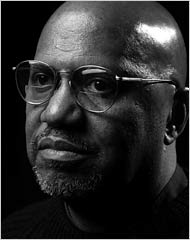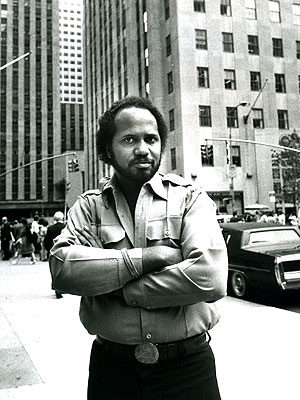St.Clair Bourne in 2006

St.Clair Bourne, Filmmaker, Dies at 64
Published: December 18, 2007 - New
York Times
By DENNIS HEVESI
St.Clair Bourne, a documentary filmmaker who recorded American black culture, produced portraits of eminent African-Americans and, in one stark film, drew a parallel between the civil rights movement and the "troubles" in Northern Ireland, died on Saturday in Manhattan. He was 64 and lived in Brooklyn.
The cause was a pulmonary embolism, said Judith Bourne, his sister and only immediate family member.
In a 36-year career in which he made more than 40 films, either producing or directing or doing both, Mr. Bourne's works were seen on public television, commercial networks and at film festivals around the country. Among his subjects were the singer, actor and activist Paul Robeson; the poet, novelist and playwright Langston Hughes; the photojournalist and filmmaker Gordon Parks; and the poet and activist Amiri Baraka.
In 1989, Mr. Bourne produced and directed "Making Do the Right Thing,'" a theatrical release about the Spike Lee film shot in Bedford-Stuyvesant, Brooklyn. In his review in The New York Times, the film critic Vincent Canby wrote, "It says something about the effectiveness of Mr. Bourne's documentary that watching a murder scene as it is being shot is almost as harrowing as watching the scene in the finished film."
"Paul Robeson: Here I Stand," Mr. Bourne's two-part series in 1999 for "American Masters" on PBS, showed that despite the public perception of its subject as a victimized, worn figure, he was clear and steadfast in his old age, asserting that progress toward racial equality was worth everything he had faced.
It was a conviction shared by Mr. Bourne. Ayuko Babu, director of the Pan African Film & Arts Festival, held annually in Los Angeles and Atlanta, said yesterday that Mr. Bourne had been shaped by the civil rights movement. "Because the African slave trade spread all over the planet," Mr. Babu said, "for us to understand ourselves, we had to have an artist like St.Clair look at all our tragedy, all our beauty, and show that back to ourselves. By doing that, he gave other cultures a way of better understanding us."
Mr. Bourne's sister said Mr. Bourne had been particularly proud of his 1996 documentary, "John Henrik Clarke: A Great and Mighty Walk," about the son of an Alabama sharecropper, born in 1915, who became an author, poet, historian, professor and a leader of the Pan-Africanist movement.
In 1983, Mr. Bourne produced and directed "The Black and the Green," in which a group of American civil rights activists traveled to Northern Ireland and found that many Catholics there had been influenced by the civil rights movement. As The Washington Post reported then, "In the Belfast ghetto, the delegation members are strangers in a familiar land of crushed tenements, graffiti-stained walls and heavily armed law officers."
The movie, Mr. Bourne told The Post, "ends up seeming pro-Irish Republican Army in the same sense that a film about Selma in the '60s might have ended up seeming pro-black, but then I'm a filmmaker from the '60s. I try to be humanistically political."
Born in Harlem on Feb. 16, 1943, Mr. Bourne was the son of St.Clair T. and Gwendolyn Samuel Bourne. When he was 2, the family moved to Brooklyn. His father was a reporter and editor with The Amsterdam News and his mother was a nurse and medical social worker.
In the early 1960s, Mr. Bourne joined the Peace Corps and went to Peru, where he started a newspaper in a poverty-ridden settlement outside of Lima. He graduated from Syracuse in 1967 with a bachelor's degree in journalism and political science. He then began studying filmmaking at Columbia University. But in 1968, he was arrested and expelled after joining in the takeover of a university building to protest the Vietnam War.
Still, a professor recommended him for a job as an assistant producer on "Black Journal," the first black public affairs series on PBS. In 1971, Mr. Bourne started his own production company, now called Chamba Mediaworks.
Mr. Bourne's marriages, to Sylvia Azure Walton and to Linda Miller, ended in divorce.
In an interview last year with Black Camera, a journal published by the Black Film Center/Archive at Indiana University, Mr. Bourne said he had tried to combine activism with journalism.
"Most of mainstream and public television in the late '60s, and even during the '70s," he said, "was from the point of view of an outsider looking at a subculture ’Äî white people looking at black people. We said we identify with and are a part of the subjects we are filming."
 (left)
St. Claire Bourne in New York City in 1981.
"Black men who define themselves from an Afrocentric point of view
fascinate me," he said in 1999
(left)
St. Claire Bourne in New York City in 1981.
"Black men who define themselves from an Afrocentric point of view
fascinate me," he said in 1999
St. Clair Bourne, 1943 - 2007
Documentary maker focused on blacks
December 19, 2007 - Los Angeles Times
By Dennis McLellan, Los Angeles Times Staff Writer, dennis.mclellan@latimes.com
St. Clair Bourne, a prominent independent documentary filmmaker whose
work focused largely on African American social and political issues
and cultural figures such as Paul Robeson and Langston Hughes, has died.
He was 64.
Bourne, a Brooklyn resident, died Saturday of pulmonary embolisms after undergoing surgery for the removal of a benign tumor on his brain, said his sister and sole survivor, Judith Bourne.
In a career that began in the late 1960s as a producer for the public affairs series "Black Journal" on public television, Bourne launched his production company, Chamba Mediaworks, in New York City in 1971.
Over 36 years, he produced and/or directed more than 45 works, including documentaries for HBO, PBS, NBC, CBS, the BBC, the Sundance Channel and National Geographic.
Among his most notable films was "Half Past Autumn: The Life and Works of Gordon Parks" (2000), an Emmy-nominated feature-length documentary about the renowned photojournalist and filmmaker that ran on HBO.
Other biographical subjects included poet-writer-activist Amiri Baraka, historian and Pan-African activist John Henrik Clarke, and Hughes, the poet, novelist and playwright.
"Black men who define themselves from an Afrocentric point of view fascinate me -- how they succeeded and overcame opposition," Bourne told American Visions in 1999, the year "Paul Robeson: Here I Stand," his documentary about the singer-actor-activist, was part of the PBS series "American Masters."
Bourne's films, however, spanned a variety of topics, including religion in "Let the Church Say Amen!," a 1974 documentary about a young black seminarian moving into the secular world.
He also dealt with popular music in "Big City Blues" and "New Orleans Brass," the past and current role of African Americans in the American West in "Heritage of the Black West" and black athletes in the BBC series "Will to Win."
He also produced and directed "The Black and the Green," a documentary chronicling a trip to Belfast, Northern Ireland, in the mid-1980s by five black American activists.
Six years later, he produced and directed "Making 'Do the Right Thing,' " a behind-the-scenes look at Spike Lee's feature film about race relations in Brooklyn's Bedford-Stuyvesant section. The well-reviewed documentary received a national theatrical release.
"For the last 25 years, he was one of the most important African American nonfiction filmmakers on the scene," said Sam Pollard, who met Bourne in 1980 and edited five of his films.
"When I met Saint, I was a 30-year-old African American male who grew up in New York City like he did," said Pollard. "He re-energized and refocused what my mission should be as a filmmaker: to document the African American experience and make people aware that it's an important part of the American experience that can't be denied."
Lou Potter, who wrote a number of Bourne's documentaries, said Bourne's "work certainly inspired a lot of people to get into the field; he was a mentor to a lot of young artists. At the time he got started it was a very, very small field" for blacks.
Although there were a considerable number of documentaries dealing with racial issues being made at the time, Potter said, "They typically were not being addressed by media from an African American point of view. They were doing it from the outside looking in; he was doing it from the inside looking out."
Last February, Bourne received the 2007 Pioneer Award from the Pan African Film & Arts Festival in Los Angeles.
"There's an African term called jali, and it means one who carries the spirit of the people and carries the story of the people," said Ayuko Babu, executive director of the festival. "That was him."
Born Feb. 16, 1943, in Harlem, N.Y., and raised in Brooklyn, Bourne was the son of St. Clair T. Bourne, a well-known journalist who worked for the New York Amsterdam News and other black newspapers in the 1930s and '40s.
In the early '60s, Bourne began studying at the School of Foreign Service at Georgetown University in Washington, D.C., but dropped out after he was arrested for participating in a sit-in at a restaurant that had refused to serve him.
Bourne joined the Peace Corps and spent two years in Lima, Peru, where he helped edit and publish a local newspaper whose transformation into a national award-winning publication led Ebony magazine to do a feature on him.
Bourne then majored in journalism and political science at Syracuse University. After graduating in 1967, he won a scholarship to Columbia University's Graduate School of the Arts, where his involvement in the radical black student movement led to his expulsion when he was among the students arrested for taking over the administration building in 1968.
But within two weeks of his arrest, Bourne landed a job as an associate producer on "Black Journal" on a recommendation from one of his professors. He quickly rose to become a producer of documentary films for the series, which won an Emmy Award during his three years there.
Bourne, whose career included a stint making documentaries for Los Angeles PBS station KCET-TV Channel 28 in the late '70s, was a founder of the Black Documentary Collective, a New York-based documentary service organization; in addition to the Los Angeles-based Black Assn. of Documentary Filmmakers-West.
A memorial service for the twice-divorced Bourne will be held at 7 p.m. Jan. 25 at the Riverside Church, 490 Riverside Drive in Manhattan.